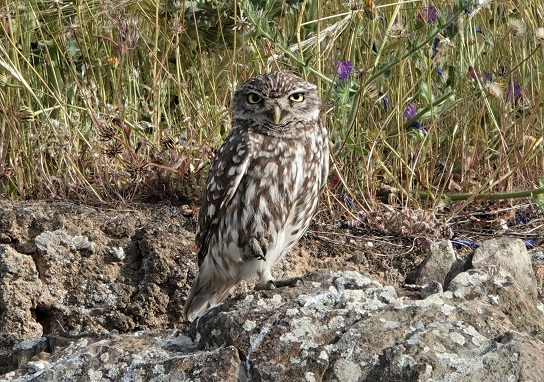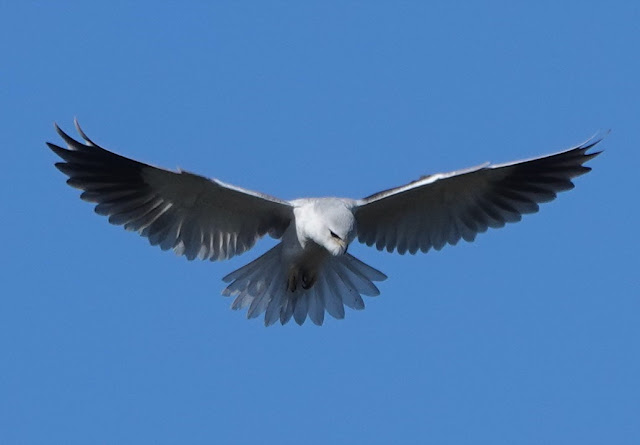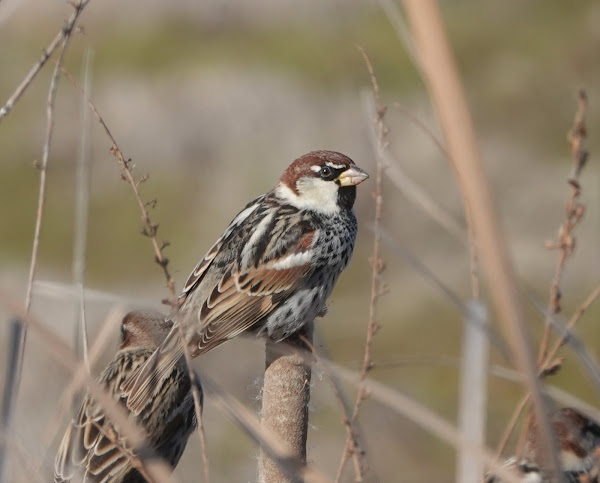Lockdown Birding Part 8
 |
| Great Cormorants passing high over the house (Martin Kelsey) |
From the balcony (again...) I notice a small skein of slender, dark birds appearing from the south-west, high above the ridge-top. I position myself better and watch them pass, continuing on a clean north-east trajectory. They are a dozen Great Cormorant. Their determined passage, in that direction, in formation and at that height suggests migration. Great Cormorants have been nesting at some reservoirs in Extremadura since 2002 (there was an isolated breeding record in the 1990s) and they now nest at Alcollarín Reservoir just 15 km away. They are, however, a very common winter visitor and one can find them not just on reservoirs and along large rivers in considerable numbers (sometimes in flocks of several hundred strong) but also encounter individuals on small ponds out on the plains or along smaller seasonal rivers in deep-set valleys.
They are a species I have seen a couple of times from the house over the span of over fifteen years that we have been here, but during lockdown, I have seen Great Cormorants on four occasions so far. Lockdown has coincided with spring migration and when I am out on the balcony I try to look-up at least half of the time, hence that small migratory group flying over silently across the vast expanse of blue sky was detected. How much more is passing overhead that I miss when I am checking the tops of bushes instead, working in the garden or simply being indoors?
 |
| Migrating Montagu's Harrier seen over the house on 7th April (Martin Kelsey) |
In a memorable, and I think almost prescient, passage in his Preface of Where to Watch Birds in Britain and Europe (1970), John Gooders wrote "If someone looks skywards long enough, say from a backyard in Solihull, he will sooner or later see a rough-legged buzzard, wild swans, and who knows what other rarities. All can be added to the list, but in what sense are they birds of a back garden? And of what interest is it that if one puts in enough hours staring skywards and has the ability to identify what is seen, perserverence will be finally rewarded by a sight of birds that we know must pass over the district every so often anyway?"
Birders across the world now are in lockdown (here is Spain for 26 days already). For us in the northern hemisphere there is a profound, gnawing sense of loss of not being out in the field to anticipate the flow of spring arrivals and migration. We are all becoming this fictional Solihull birder. And I suspect that as the weeks of lockdown progress, most of us will profoundly disagree with Gooders' assertion. He ignores two fundamental points.
First is the context of the balcony or backyard. It is no different from a birdwatching hide or a coastal headland. It is a place which offers a view onto the world. A seawatcher will sit in a sheltered spot on a cliff-top and train a telescope onto distant objects far out to sea: those skuas or shearwaters have no tangible affiliation with that landmark to be sure, but for the observer it is the access portal for discovery, exploration and connection with vast biological processes that extend way beyond the limits of our senses. My balcony (or the Solihull backyard) is our link now to seasonal change and migration. The skies above us are pathways and foraging grounds, as significant as any tree, shrub or pavement.
And secondly, is the passion that drives us all as naturalists, and our curiosity. These energies are being significantly tested at the moment, but wherever we are and whatever we are doing, we always have our vision and hearing innately plugged in to our surroundings. This not just offers personal satisfaction. There are more birds passing over us than we can possibly imagine. Thanks to citizen's science, backyard records are changing our knowledge and understanding of bird migration and phenology, not least through the amazing findings that people are making by analysing sound recordings made at nightime of birds on nocturnal migration.
 |
| April's moon from the balcony (Martin Kelsey) |



Comments
Brian Banks